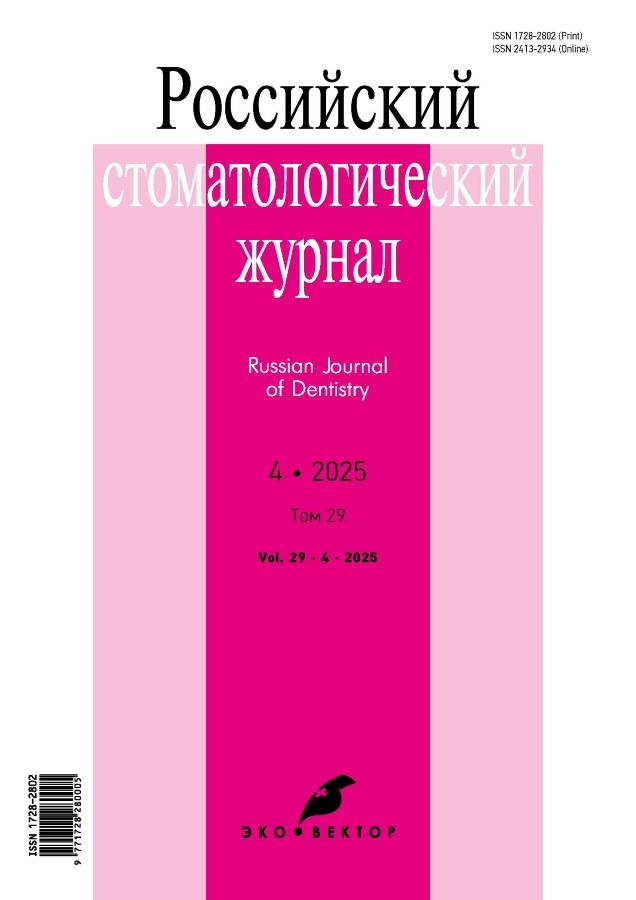Influence of root wall thickness on stress distribution in dentin following endodontic treatment
- Authors: Nekrasova E.A.1, Olesova E.A.1, Glazkova E.V.1, Olesov E.E.1
-
Affiliations:
- State Research Center—Burnasyan Federal Medical Biophysical Center of Federal Medical Biological Agency
- Issue: Vol 29, No 4 (2025)
- Pages: 340-344
- Section: Original Study Articles
- Submitted: 30.05.2025
- Accepted: 23.06.2025
- Published: 29.08.2025
- URL: https://rjdentistry.com/1728-2802/article/view/681671
- DOI: https://doi.org/10.17816/dent681671
- EDN: https://elibrary.ru/JGHYAC
- ID: 681671
Cite item
Abstract
BACKGROUND: Predicting complications such as root fractures or cracks necessitates investigation of stress distribution in tooth roots under various biomechanical conditions, particularly with alterations in dimensional and mechanical properties of the tooth.
AIM: This study aimed to model functional stress distribution in the root of a devitalized tooth using three-dimensional mathematical simulation based on varying dentin wall thickness.
METHODS: A mathematical modeling approach was used to analyze the magnitude and distribution of stresses in the root of a devitalized tooth under an oblique load of 150 N at a 30°. The study compared stress levels across three tooth models with root wall thicknesses of 1.0 mm, 1.5 mm, and 2.0 mm.
RESULTS: A direct relationship was established between decreasing root wall thickness and increasing stress levels in dentin of devitalized teeth. This effect was most pronounced in the model with a 1.0-mm wall, where stresses approached the ultimate strength of dentin. Stress distribution patterns revealed the cervical region as the site of maximum concentration.
CONCLUSION: Reduced dentin wall thickness in devitalized teeth leads to increased functional stress, with peak values localized in the cervical region. Root dentin with a thickness of 1.0 mm may be subjected to stresses exceeding its structural integrity.
Full Text
About the authors
Ekaterina A. Nekrasova
State Research Center—Burnasyan Federal Medical Biophysical Center of Federal Medical Biological Agency
Email: ekaterina233@mail.ru
ORCID iD: 0000-0003-0380-0575
SPIN-code: 4291-2151
Russian Federation, 46 Zhivopisnaja st, Moscow, 123098
Emilia A. Olesova
State Research Center—Burnasyan Federal Medical Biophysical Center of Federal Medical Biological Agency
Author for correspondence.
Email: emma.olesova@mail.ru
ORCID iD: 0000-0003-4511-6317
SPIN-code: 5767-9158
Russian Federation, 46 Zhivopisnaja st, Moscow, 123098
Elena V. Glazkova
State Research Center—Burnasyan Federal Medical Biophysical Center of Federal Medical Biological Agency
Email: pozharskaya_lena@mail.ru
ORCID iD: 0000-0002-9825-4935
SPIN-code: 5304-9137
MD, Cand. Sci. (Medicine), Associate Professor
Russian Federation, 46 Zhivopisnaja st, Moscow, 123098Egor E. Olesov
State Research Center—Burnasyan Federal Medical Biophysical Center of Federal Medical Biological Agency
Email: olesov_georgiy@mail.ru
ORCID iD: 0000-0001-9165-2554
SPIN-code: 8924-3520
MD, Dr. Sci. (Medicine), Professor
Russian Federation, 46 Zhivopisnaja st, Moscow, 123098References
- Aksamit LA, Arutjunov SD, Atrushkevich VG, et al, Therapeutic dentistry: National guidelines. 2nd edition. Dmitrieva LA, Maksimovskij JuM, editors. Мoscow: GJeOTAR-Media; 2015. (In Russ.) EDN: VCUWPT
- Akulovich AV, Anisimova EN, Anisimova NJu, et al. Orthopedic dentistry: National guidelines. Lebedenko IJu, Arutjunov SD, Rjahovskij AN, editors. Мoscow: GJeOTAR-Media; 2022. (In Russ.) doi: 10.33029/9704-6367-3-OD2-2022-1-416 EDN: ULMYYK
- Olesova EA, Ilyin AA, Arutyunov SD, et al. Risk factors for the appearance of cracks and fractures of teeth according to a survey of dentists. Russian Journal of Dentistry. 2024;28(6):562–568. doi: 10.17816/dent634360 EDN: HFEBPX
- Tabulated values of physical and mechanical properties. Appendix A. In: O’Brien WJ, editor. Dental materials and selection. 3nd edition. Chicago, Berlin, London, Tokyo, Paris, Barcelona, Sao Paolo, Moscow, Prague, Warsaw; 2022. P. 503.
- Muslov SA, Arutjunov SD. Mechanical properties of teeth and periodontal tissues. Мoscow: Izdatel’skij dom «Prakticheskaja medicina»; 2020. 256 с. (In Russ.) EDN: ITZXLG
- Olesova EA, Ilyin AA, Em AV, et al. Effect of biomechanical load factors on the stress-strain state of teeth and underlying bone tissue. Russian Journal of Dentistry. 2024;28(5):462–468. doi: 10.17816/dent634253 EDN: HVIETH
- Rozov RA, Trezubov VN, Gvetadze RSh, et al. Experimental design of the lower jaw functional loading for implant-supported restoration in unfavorable clinical conditions. Stomatology. 2022;101(6):28–34. doi: 10.17116/stomat202210106128 EDN: KKPPHB
- Zaslavsky RS, Olesova VN, Povstyanko YuA, et al. Three-dimensional mathematical modeling of functional stresses around a dental implant in comparison with a single-root tooth. Russian Bulletin of Dental Implantology. 2022;(3-4):4–10. EDN: JHRTIG
- Abakarov SI, Sorokin DV, Lapushko VYu, Abakarova SS. Stress-deformed state of a non-removable prosthesis on implants under mustering load depending on the angle of abutment wall tilt. Clinical Dentistry (Russia). 2023;26(1):147–157. doi: 10.37988/1811-153X_2023_1_147 EDN: KBFJYD
Supplementary files









